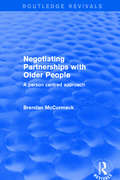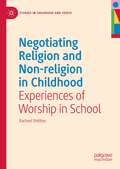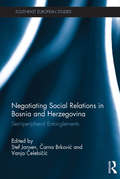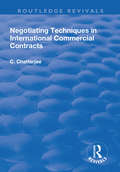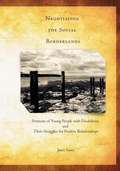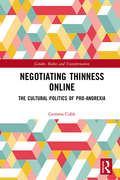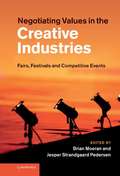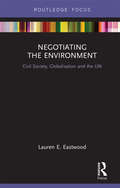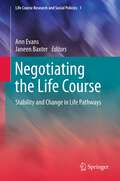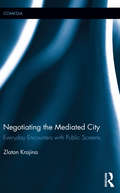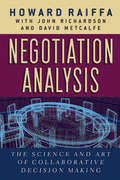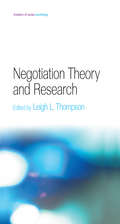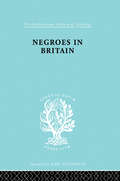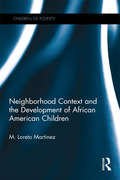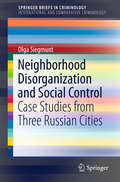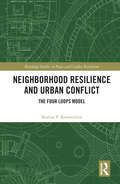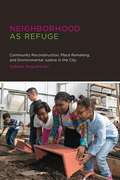- Table View
- List View
Negotiating Partnerships with Older People: A Person Centred Approach (Routledge Revivals)
by Brendan McCormackThis title was first published in 2001. Much discussion takes place concerning the nature of the relationship between nurses and older people in hospital and there have been many concerns expresses in United Kingdom policy documents about the quality of care for older people in hospitals. Autonomy is considered to be one of the central ethical principles of health care practice and as such is a significantly relevant concept for nurses. This book presents the results of a study undertaken with nurses who work with older people in hospitals. Issues arising from the study include the effects of institutional constraints on autonomy. A framework for person-centred practice has been developed from this work that emphasizes the values of the individual and their needs, wants and desires. The role of the nurse in facilitating practice that respects an individual's values is outlined, and the importance of nurses in negotiating relationships with older people is also emphasized.
Negotiating Privilege and Identity in Educational Contexts (Routledge Research in Education)
by Adam Howard Brianne Wheeler Aimee PolimenoRecent efforts emphasize the roles that privilege and elite education play in shaping affluent youths’ identities. Despite various backgrounds, the common qualities shared among the eight adolescents showcased in this book lead them to form particular understandings of self, others, and the world around them that serve as means for them to negotiate their privilege. These self-understandings are crucial for them to feel more at ease with being privileged, foster a positive sense of self, and reduce the negative feelings associated with their advantages – thus managing expectations for future success. Offering an intimate and comprehensive view of affluent adolescents’ inner lives and understandings, Negotiating Privilege and Identity in Educational Contexts explores these qualities and provides an important alternative perspective on privilege and how privilege works. The case studies in this volume explore different settings and lived experiences of eight privileged adolescents who, influenced by various sources, actively construct and cultivate their own privilege. Their stories address a wide range of issues relevant to the study of adolescence and the various social class factors that mediate adolescents’ educational experiences and identities.
Negotiating Religion and Non-religion in Childhood: Experiences of Worship in School (Studies in Childhood and Youth)
by Rachael ShillitoeThis book explores how and if the mandate for children to worship in schools can be justified within the context of declining church attendance and increasing nonreligious identification in British society. Shillitoe asks what place compulsory worship has in an increasingly diverse and plural society, and what the answer means for the relationship between religion, the secular, and education more broadly. Through in-depth ethnographic fieldwork from across three schools in southwest England, the book reveals how examining the significance of children’s experiences expands our understanding of both collective worship in schooling and religion in social life more broadly and demonstrates that adult-centric anxieties and assumptions in this area do not always reflect the experiences of children.
Negotiating Social Relations in Bosnia and Herzegovina: Semiperipheral Entanglements (Southeast European Studies)
by Čarna Brković Stef Jansen Vanja ČelebičićExploring recent configurations of social relations in post-socialist, post-war, post-Yugoslav Bosnia and Herzegovina this collection of ethnographic research turns an analytical lens on questions of sociality. Contributions based on long-term, in-depth research projects explore how people in different parts of BiH make and remake social relations and outline how their practices of sociality relate to donor-set priorities and formal human rights provisions. The book explores the socio-political concerns which have emerged within BiH, incites interdisciplinary conversations and sheds critical light on ways of engaging with these concerns and discusses forms of sociality, politics and agency which remain largely absent from the official political discourse and practice of local and foreign actors. Explicitly focusing on social relations in BiH against the historical background of both war and Yugoslav socialism, and directly placing these in relation to authoritative discourses and policies regarding BiH today brings the different strands together while the commentaries of specialists who have studied BiH in different ways explicitly situates the contribution of ethnographic work in the country.
Negotiating Techniques in International Commercial Contracts
by Charles ChatterjeeDrafting and Negotiating Commercial Contracts, Fourth Edition is the 'one-stop-shop' for practical contractual matters, making it essential reading for anyone involved in negotiating and drafting commercial contracts.Many works published on the topic of negotiating have dealt with techniques of and preparation for negotiation from a psychological standpoint, but this book contends that in the commercial world, hard commercial considerations rather than psychological warfare matter most in successfully negotiating commercial contracts. The text highlights the most important special features of selected contracts, namely payment contracts and petroleum contracts in addition to ordinary export contracts, syndicated loan agreements, international engineering and construction contracts, and issues relating to project finance and risk. One of the basic themes of this work is to remind negotiators of the changing attitudes towards the negotiation of international commercial contracts, including more awareness of bargaining powers of both parties. The Fourth Edition has been fully updated to take account of important court decisions regarding the interpretation of contracts and changes in consumer legislation. This includes commercial lawyers, contract managers, in-house lawyers, lawyers in private practice, LPC course tutors and law and business students.
Negotiating The Social Borderlands: Portraits of Young People with Disabilities and Their Struggles for Positive Relationships
by Janet SauerThis book provides readers with narratives of the lives of three young people with significant disabilities. The author uses portraiture to narrate the stories of three young people and to capture the myriad dimensions of each unique individual. These portraits expose a balance between empirical description and aesthetic expression and provide a singular view into the nuances and complexities of each young person's life, while depicting their unique social contexts and how they fit within those milieux. Never losing sight of the dimensions of the selves of these notable young people and the contexts in which they exist, the author presents the qualitative techniques of inquiry she used to examine the complexities involved in the co-constructions of meaning among the young people and their communication partners. Without wavering, she explores their deep relationships and the contexts where positive reciprocal relationships developed between young people with disabilities and nondisabled people and how these relationships evolved from the perspectives of the participants. Negotiating the Social Borderlands, an unapologetic presentation of a remarkable set of portrait narratives, is written for a broad audience and, thus, offers an inherently complex and sensitive portrayal of three personal stories in which a variety of contextualized issues can be examined and discussed in light of each readers' practices, policies, and perspectives.
Negotiating Thinness Online: The Cultural Politics of Pro-anorexia (Gender, Bodies and Transformation)
by Gemma CobbThis book interrogates the thin ideal in pro-anorexia online spaces and the way in which it operates on a continuum with everyday discourses around thinness. Since their inception in the late twentieth century, pro-anorexia online spaces have courted controversy: they have been vilified by the media and deleted by Internet moderators. This book explores the phenomenon during its tipping point where it migrated from websites and discussion forums to image-centric social media platforms – all the while seeking to circumvent censorship by, for instance, repudiating ‘pro-ana’ or adopting hashtags to obfuscate content. The author argues that instead of being driven further underground, ‘pro-ana’ is blurring the boundaries between normative and deviant conceptions of thinness. Situating the phenomenon in relation to accepted constructions of thinness, promulgated by establishments as far ranging as medicine and women’s magazines, this book asks if ‘pro-ana’ holds the potential to critique that which has long been considered normal: the culture of compulsory thinness. Engaging with debates including the current climate of postfeminism and neoliberalism, digital censorship, the pre-eminence of white, middle-class, heterofemininity, and the articulation of pain in realising the thin ideal, Negotiating Thinness Online examines what happens when the margins and the mainstream merge.
Negotiating Values in the Creative Industries
by Brian Moeran Jesper Strandgaard PedersenFairs, festivals and competitive events play a crucial role in the creative industries; yet their significance has been largely overlooked. This book explores the role of such events through a series of studies that include some of the most iconic fairs and festivals in the world. It brings together a team of distinguished scholars to examine art fairs, biennales, auctions, book fairs, television programming markets, film festivals, animation film festivals, country music festivals, fashion weeks, wine classifications and wine tasting events. This diverse set of studies shows that such events serve a variety of purposes: as field-configuring events (FCEs), as a way of ritualising industry practices and as 'tournaments of values' where participants negotiate different cultural values to resolve economic issues. Suitable for academics and practitioners, this book presents a fascinating new perspective on the role and importance of fairs, festivals and competitive events in the creative industries.
Negotiating the Arctic: The Construction of an International Region (Studies in International Relations)
by E.C.H KeskitaloThis work draws upon the history of Arctic development and the view of the Arctic in different states to explain how such a discourse has manifested itself in current broader cooperation across eight statistics analysis based on organization developments from the late 1970s to the present, shows that international region discourse has largely been forwarded through the extensive role of North American, particularly Canadian, networks and deriving form their frontier-based conceptualization of the north.
Negotiating the Christian Past in China: Memory and Missions in Contemporary Xiamen (World Christianity)
by Jifeng LiuAt the turn of the twenty-first century, Xiamen’s pursuit of World Heritage Site designation from UNESCO stimulated considerable interest in the city’s Christian past. History enthusiasts, both Christian and non-Christian, devoted themselves to reinterpreting the legacy of missionaries and challenged official narratives of Christianity’s troubled associations with Western imperialism. In this book, Jifeng Liu documents the tension that has inevitably emerged between the established official history and these popular efforts.This volume elucidates the ways in which Christianity has become an integral part of Xiamen, a Chinese city profoundly influenced by Western missionaries. Drawing on extensive interviews, locally produced histories, and observations of historical celebrations, Liu provides an intimate portrait of the people who navigate ideological issues to reconstruct a Christian past, reproduce religious histories, and redefine local power structures in the shadow of the state. Liu makes a compelling argument that a Christian past is being constructed that combines official frameworks, unofficial practices, and nostalgia into social memory, a realm of dynamic negotiation that is neither dominated by the authoritarian state nor characterized by popular resistance. In this way, Negotiating the Christian Past in China illustrates the complexities of memory and missions in shaping the city’s cultural landscape, church-state dynamics, and global aspirations.This groundbreaking study assumes a perspective of globalization and localization, in both the past and the present, to better understand Chinese Christianity in a local, national, and global context. It will be welcomed by scholars of religious studies and world Christianity, and by those interested in the church-state relationship in China.
Negotiating the Environment: Civil Society, Globalisation and the UN (Routledge Focus on Environment and Sustainability)
by Lauren E EastwoodCivil society participants have voiced concerns that the environmental problems that were the subject of multilateral environmental agreements negotiated during the 1992 Rio processes are not serving to ameliorate global environmental problems. These concerns raise significant questions regarding the utility of negotiating agreements through the UN. This book elucidates the complexity of how participants engage in these negotiations through the various processes that take place under the auspices of the UN—primarily those related to climate and biological diversity. By taking an ethnographic approach and providing concrete examples of how it is that civil society participants engage in making policy, this book develops a robust sense of the implications of the current terrain of policy-making—both for the environment, and for the continued participation of non-state actors in multilateral environmental governance. Using data gathered at actual negotiations, the book develops concepts such as participation and governance beyond theory. The research uses participant observation ethnographic methods to tie the theoretical frameworks to people’s actual activities as policy is generated and contested. Whereas topics associated with global environmental governance are traditionally addressed in fields such as international relations and political science, this book contributes to developing a richer understanding of the theories using a sociological framework, tying individual activities into larger social relations and shedding light on critical questions associated with transnational civil society and global politics.
Negotiating the Life Course
by Ann Evans Janeen BaxterPathways through the life course have changed considerably in recent decades. Many of our assumptions about leaving home, starting new relationships and having children have been turned upside down. It is now almost as common to have children prior to marriage as afterwards, and certainly much more common to live together before marrying than to marry without first living together. Women are more likely to remain in the labour force after having children and many families struggle with problems of work-family balance at some stage in their lives, particularly when they have young children. But how much has really changed? Is there really more diversity in how individuals transition through these life course stages, or just variations at the margin with most people following a standard work and family life course? This volume makes use of rich longitudinal data from a unique Australian project to examine these issues. Drawing on broader theories of social change and demographic transitions in an international context, each chapter provides a detailed empirical assessment of the ways in which Australian adults negotiate their work and family lives. In doing so, the volume provides important insight into the ways in which recent demographic, social and economic changes both challenge and reproduce gender divisions.
Negotiating the Mediated City: Everyday Encounters with Public Screens (Comedia)
by Zlatan KrajinaThis book is an interdisciplinary empirical investigation of how people interact with public screens in their daily lives. In more and more surprising locations, screens of various kinds appear within the sightlines of passers-by in contemporary cities. Outdoor advertisers target audiences which are increasingly mobile, public art uses screens to interrogate urban change, while postmodern architecture finds electronic imagery a suitable tool of expression. Traditionally, urban sociology research has assumed that people seek to filter urban stimuli, but recent accounts of public screens suggest producers design and position display interfaces site-specifically, so as to engage with those moving past. This study offers insight both into the dynamics of actual encounters and into the long-term process of how people learn to live with repeated invitations to consume media in public spaces. The book includes four cases: street advertising, underground transport advertising, and installation art in London (UK) and media façade architecture in Zadar (Croatia). Krajina shows that maintaining familiarity with everyday surroundings in media cities that change beyond citizens' control is a temporary achievement--and a recursive struggle. Finalist for the Jane Jacobs Urban Communication Foundation book award, 2014
Negotiation Analysis: The Science and Art of Collaborative Decision Making
by Howard RaiffaThis masterly book substantially extends Howard Raiffa’s earlier classic, The Art and Science of Negotiation. It does so by incorporating three additional supporting strands of inquiry: individual decision analysis, judgmental decision making, and game theory. Each strand is introduced and used in analyzing negotiations. The book starts by considering how analytically minded parties can generate joint gains and distribute them equitably by negotiating with full, open, truthful exchanges. The book then examines models that disengage step by step from that ideal. It also shows how a neutral outsider (intervenor) can help all negotiators by providing joint, neutral analysis of their problem. Although analytical in its approach—building from simple hypothetical examples—the book can be understood by those with only a high school background in mathematics. It therefore will have a broad relevance for both the theory and practice of negotiation analysis as it is applied to disputes that range from those between family members, business partners, and business competitors to those involving labor and management, environmentalists and developers, and nations.
Negotiation Neuroscience: The Brain Science Behind Business Deals
by Federico AddimandoThe book delves into the fascinating intersection of neuroscience and negotiation, offering a groundbreaking exploration into how our brains influence and are influenced by the negotiation process. With an emphasis on practical application, this book is designed to equip readers with a deep understanding of the neurological mechanisms during negotiations, empowering them to optimize their approach and achieve better outcomes in business deals. Structured for both accessibility and depth, the book begins with an exploration of the fundamental principles of negotiation neuroscience, providing readers with a solid foundation of knowledge. It then progresses to more advanced topics, such as the role of emotions, cognitive biases, and decision-making processes in negotiations. Each chapter is rich with real-world examples, case studies, and practical tips, ensuring readers can immediately apply their newfound insights to their negotiation scenarios. In today's rapidly evolving business landscape, where successful negotiation skills are essential for navigating complex deals and relationships, understanding the neuroscience behind negotiation is more crucial than ever.
Negotiation Theory and Research (Frontiers of Social Psychology)
by Leigh L. ThompsonNegotiation is the most important skill anyone in the business world can have today, because people must continually negotiate their jobs, responsibilities, and opportunities. Yet very few people know strategies for maximizing their outcomes in everyday and in more formal business situations. This volume provides a comprehensive overview of this emerging topic through original contributions from leaders in social psychology and negotiation research. All topics covered are core to the understanding of the negotiation process and include: decision-making and judgment, emotion and negotiation, motivation, and game theory.
Negotiation: Moving From Conflict to Agreement
by Kevin W. Rockmann Claus W. Langfred Matthew A. CroninNegotiation: Moving From Conflict to Agreement helps students see how negotiation is all around them. Using every day and business examples, authors Kevin W. Rockmann, Claus W. Langfred, and Matthew A. Cronin explain how to negotiate with an emphasis on when and why to use certain tactics and approach. Focusing on the psychology of negotiation levers such as reciprocity, uncertainty, power, and alternatives, the text helps students understand all the ways they can negotiate to create value. Packed with practical advice, integrated coverage of ethics, cases, and role-playing exercises, this compelling new text takes an applied approach to negotiation, allowing students to gain confidence and experience as they practice honing their own negotiation skills. Included with this title: The password-protected Instructor Resource Site (formally known as SAGE Edge) offers access to all text-specific resources, including a test bank and editable, chapter-specific PowerPoint® slides.
Negotiation: Moving From Conflict to Agreement
by Kevin W. Rockmann Claus W. Langfred Matthew A. CroninNegotiation: Moving From Conflict to Agreement helps students see how negotiation is all around them. Using every day and business examples, authors Kevin W. Rockmann, Claus W. Langfred, and Matthew A. Cronin explain how to negotiate with an emphasis on when and why to use certain tactics and approach. Focusing on the psychology of negotiation levers such as reciprocity, uncertainty, power, and alternatives, the text helps students understand all the ways they can negotiate to create value. Packed with practical advice, integrated coverage of ethics, cases, and role-playing exercises, this compelling new text takes an applied approach to negotiation, allowing students to gain confidence and experience as they practice honing their own negotiation skills. Included with this title: The password-protected Instructor Resource Site (formally known as SAGE Edge) offers access to all text-specific resources, including a test bank and editable, chapter-specific PowerPoint® slides.
Negroes in Britain: A Study of Racial Relations in English Society (International Library of Sociology)
by K. L. LittleFirst published in 1998. Routledge is an imprint of Taylor & Francis, an informa company.
Neighborhood Context and the Development of African American Children (Children of Poverty)
by Maria Loreto MartinezThe evidence of worsening life conditions, concentration of poverty, and high degree of African American segregation in urban areas has led to a growing interest in how neighborhood contexts effect child development and parenting behavior. This study attempts to understand development in context by focusing on the role of neighborhood influences early in child development and to shed light on the pathways by which family and community resources influence development.
Neighborhood Disorganization and Social Control
by Olga SiegmuntThis Brief presents a framework for understanding the role of school and neighborhood contexts in the development of self-control. Through the application of Gottfredson and Hirschi's general theory of crime and Shaw and McKay's social disorganization theory, the authors of this Brief examine the importance of family socialization and school and neighborhood for self-control of youth in three Russian cities, replicating results from an earlier study in Germany. The cases presented in the Brief found that family socialization is important for self-control, but it interacts with school and neighbourhood contexts. According to the study, school social control as a structural characteristic can lead to less delinquency, even if students did not develop self-control. Self-control mediates parental supervision and attachment to parents on one hand, and juvenile delinquency on the other hand. However it was not found to mediate neighbourhood context characteristics. The results of the study provide a research framework that can be applied to other international, comparative contexts. It will be of interest to researchers in Criminology and Criminal Justice, particularly Developmental and Life-Course Criminology, as well as related fields such as Public Policy and Social Work.
Neighborhood Resilience and Urban Conflict: The Four Loops Model (Routledge Studies in Peace and Conflict Resolution)
by Karina V. KorostelinaThis book explores the resilience in urban neighborhoods affected by chronic conflict and violence, developing a new model for improving resilience policies. The neighborhood resilience approach is an inclusive form of building positive resilience, which recognizes that local communities possess valuable skills and experience of dealing with crises, and prioritizes the agency of local communities in the production of knowledge and developing practices. The book identifies and describes the repertoire of neighborhood resilience practices organized in four clusters: (1) addressing the structure of conflict; (2) increasing the effectiveness of external resources; (3) enhancing the community capacities; and (4) reflecting the dynamics of identity and power in neighborhoods. One of the key findings of the book is the nonlinear connections between structure and dynamics of conflict and neighborhood resilience practices represented in the Four Loops Model. The concentration on community-based practices addresses macro-level critiques of neo-liberalism in critical resilience studies and encourages rethinking the ways community-based indicators might operate in combination with existing macro indicators of resilience. The bottom-up indicators provide more specific details and essential localized experiences for improving resilience policies at the national level. This book will be of much interest to students of conflict resolution, resilience, urban studies, and US politics.
Neighborhood Success Stories: Creating and Sustaining Affordable Housing in New York
by Carol LambergThe high cost of building affordable housing in New York, and cities like it, has long been a topic of urgent debate. Yet despite its paramount importance and the endless work of public and private groups to find ways to provide it, affordable housing continues to be an elusive commodity in New York City—and increasingly so in our current economic and political climate. In a timely, captivating memoir, Carol Lamberg weighs in on this vital issue with the lessons she learned and the successes she won while working with the Settlement Housing Fund, where she was executive director from 1983 until 2014. Lamberg provides a unique perspective on the great changes that have swept the housing arena since the curtailment of the welfare state in the 1970s, and spells out what is needed to address today’s housing problems. In a tradition of “big city” social work memoirs stretching back to Jane Addams, Lamberg reflects on the social purpose, vision, and practical challenges of the projects she’s been involved in, while vividly capturing the life and times of those who engaged in the creation and maintenance of housing and those who have benefited from it. Using a wealth of interviews with managers and residents alike, alongside the author’s firsthand experiences, this book depicts examples of successful community development between 1975 and 1997 in the Bronx and on the Lower East Side of Manhattan. In the “West Bronx Story,” Lamberg details the painful but ultimately exhilarating development of eighteen buildings that comprise New Settlement Apartments—a dramatic transformation of a devastated neighborhood into a thriving community. In “A Tale of Two Bridges,” the author depicts a different path to success, along with its particular challenges. The redevelopment of this area on the Lower East Side involved six different Federal housing programs and consisted of six residential sites, a running track, and a large scale supermarket. To this day, forty years later, all the buildings remain strong. With Neighborhood Success Stories, Lamberg offers a roadmap to making affordable housing a reality with the key ingredients of dogged persistence, group efforts, and creative coalition building. Her powerful memoir provides hope and practical encouragement in times that are more challenging than ever.
Neighborhood and Life Chances: How Place Matters in Modern America (The City in the Twenty-First Century)
by Eugenie L. Birch Susan M. Wachter Harriet B. NewburgerDoes the place where you lived as a child affect your health as an adult? To what degree does your neighbor's success influence your own potential? The importance of place is increasingly recognized in urban research as an important variable in understanding individual and household outcomes. Place matters in education, physical health, crime, violence, housing, family income, mental health, and discrimination—issues that determine the quality of life, especially among low-income residents of urban areas.Neighborhood and Life Chances: How Place Matters in Modern America brings together researchers from a range of disciplines to present the findings of studies in the fields of education, health, and housing. The results are intriguing and surprising, particularly the debate over Moving to Opportunity, an experiment conducted by the Department of Housing and Urban Development, designed to test directly the effects of relocating individuals away from areas of concentrated poverty. Its results, while strong in some respects, showed very different outcomes for boys and girls, with girls more likely than boys to experience positive outcomes. Reviews of the literature in education and health, supplemented by new research, demonstrate that the problems associated with residing in a negative environment are indisputable, but also suggest the directions in which solutions may lie.The essays collected in this volume give readers a clear sense of the magnitude of contemporary challenges in metropolitan America and of the role that place plays in reinforcing them. Although the contributors suggest many practical immediate interventions, they also recognize the vital importance of continued long-term efforts to rectify place-based limitations on lifetime opportunities.
Neighborhood as Refuge
by Isabelle AnguelovskiEnvironmental justice as studied in a variety of disciplines is most often associated with redressing disproportionate exposure to pollution, contamination, and toxic sites. In Neighborhood as Refuge, Isabelle Anguelovski takes a broader view of environmental justice, examining wide-ranging comprehensive efforts at neighborhood environmental revitalization that include parks, urban agriculture, fresh food markets, playgrounds, housing, and waste management. She investigates and compares three minority, low-income neighborhoods that organized to improve environmental quality and livability: Casc Antic, in Barcelona; Dudley, in the Roxbury section of Boston; and Cayo Hueso, in Havana. Despite the differing histories and political contexts of these three communities, Anguelovski finds similar patterns of activism. She shows that behind successful revitalization efforts is what she calls "bottom to bottom" networking, powered by broad coalitions of residents, community organizations, architects, artists, funders, political leaders, and at times environmental advocacy groups. Anguelovski also describes how, over time, environmental projects provide psychological benefits, serving as a way to heal a marginalized and environmentally traumatized urban neighborhood. They encourage a sense of rootedness and of attachment to place, creating safe havens that offer residents a space for recovery. They also help to bolster residents' ability to deal with the negative dynamics of discrimination and provide spaces for broader political struggles including gentrification. Drawing on the cases of Barcelona, Boston, and Havana, Anguelovski presents a new holistic framework for understanding environmental justice action in cities, with the right to a healthy community environment at its core.
